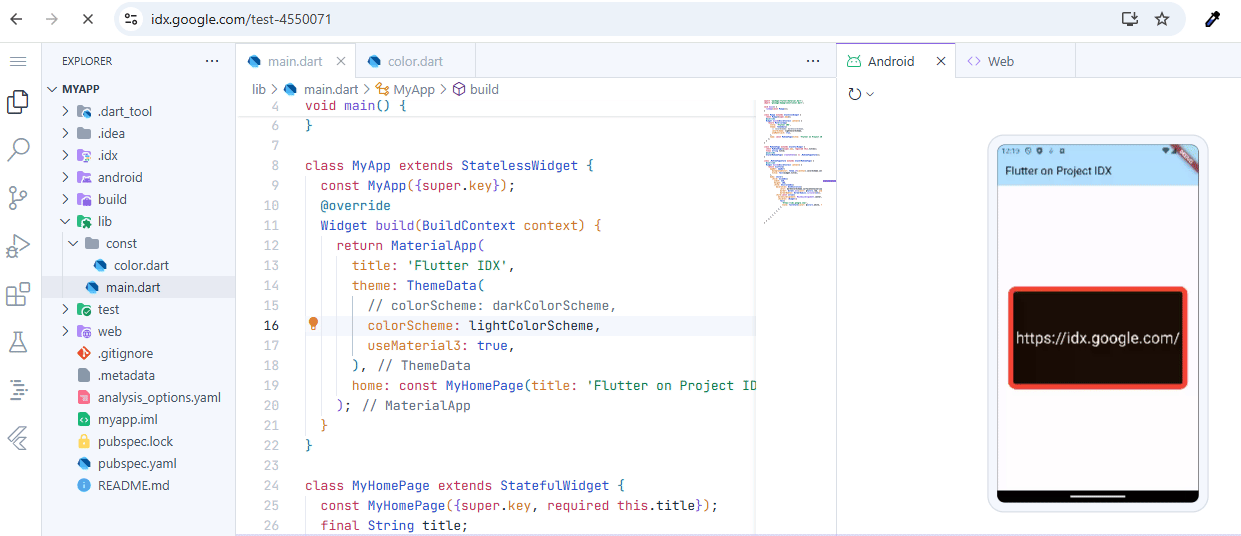Hello birds ![]()
Does anyone here uses an Arch based Linux for Flutter app development? And how was the experience?
I’m experimenting with Endeavouros with KDE desktop, and I like how it’s smooth and lightweight on my old laptop.
I’m also considering Ubuntu (maybe Kubuntu) if it would be more adequate for Flutter development.
Unfortunately for now I can’t afford a macbook nor a PC that runs Windows 11 smoothly.
Any advice or guidance for someone who is getting started with Flutter.
You might want to check out IDX from Google to pick up a fully configured remote development system as a way of decoupling your OS or your machine specs from your Flutter development options.
I’ve been using it for a couple of months now on a low end Chromebook and generally only have good things to say about it but it sounds like it might be a good fit for the situation you’re describing. I hope it helps!
Use IDX, I have build a few test apps and had a good experience. ![]()
I heard about it but didn’t try it yet.
How about the emulator(Android)? Is it integrated with IDX
Yep, works out of the box, no configuration needed.
Build in emulator, register and build
Which type of guidance are you searching for ?
Ubuntu (and alts) can be used for Flutter Development. You can install Android emulators, develop for them.
If you are willing to build for iOS, you can rent MacOS machine, access them through VNC, and develop you app on it.
The developer experience might not be the best, but that’s always a possibility.
I might develop the subject a bit more when I’ll be in front of a computer (rn on my phone).
Don’t hesitate if you have questions.
Here is a example, you can do Android and WEB

I’ve tried Ubuntu 24.04 with Gnome desktop, installed Flutter, VSCode and Android studio from Snap store, the installation process was straightforward, but the overall experience was laggy because the relatively old laptop.
In contrast to Endeavouros (Arch based Linux) with KDE desktop which runs very smooth but I’m not sure if it’s suitable for working with Flutter and what are long term considerations.
I’ve been using Ubuntu for daily professional Flutter dev since 2019, works very well and Ubuntu of course is now using Flutter for some of the OS app development too. I mostly use VSCode but Android Studio works just as well.
I’m not a huge fan of Snap though, so I install VSCode from debs and Flutter SDK via usual git based install from flutter.dev
I don’t think it would be much difference to using Arch+KDE vs Ubuntu+Gnome, use whatever works best for you. I found even as a long time Linux user Arch was a bit too bleeding edge for my work usecases, but really I can’t see why choice of any mainstream distro would be an issue for doing Flutter dev work.
Ideally, I avoid to use snap (or flatpak) for development tools. In this case, I rather install Flutter directly, and Android Studio using Jetbrains Toolbox, since I have better control on which version I use. VSCode would be the exception, since versions are a bit harder to manage.
Snaps/Flatpaks/Appimages are having a performance impact, so overall good to avoid them specially in older systems.
fyi, I’ve been using Ubuntu as my daily development platform for years, and I wouldn’t choose another distro for productivity.
I use Arch on my work laptop and I use it using WSL on Windows, both work great. It is very lightweight; I recommend a lightweight DE or a tiling WM like Hyprland. It’s resource friendly but takes effort to set up.
Didn’t understand why is VSCode an exception?
If I am not wrong, VS Code doesn’t manage the updates by itself but relies on whatever package manager you used to install it. In that case, Snap is the easiest way to ensure you are running the latest version, as it is being published by themselves.
With Flutter, you can run flutter upgrade and with Android Studio you upgrade it with the JetBrains Toolbox or withing AS itself.